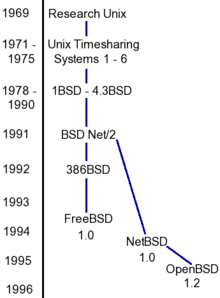Software fork: Difference between revisions
Jump to navigation
Jump to search

imported>Subpagination Bot m (Add {{subpages}} and remove any categories (details)) |
imported>Meg Taylor (move links to subgroup) |
||
| Line 1: | Line 1: | ||
{{subpages}} | {{subpages}} | ||
: ''This article is about "forking" of a software project into two or more different projects. For the operating system term for starting a new process, see [[fork (operating system)]]'' | : ''This article is about "forking" of a software project into two or more different projects. For the operating system term for starting a new process, see [[fork (operating system)]]'' | ||
| Line 10: | Line 9: | ||
*"The BSDs" (FreeBSD, NetBSD and OpenBSD) are three popular forks of the original [[Berkeley Software Distribution]], which is itself a descendant of [[Unix]] | *"The BSDs" (FreeBSD, NetBSD and OpenBSD) are three popular forks of the original [[Berkeley Software Distribution]], which is itself a descendant of [[Unix]] | ||
Revision as of 07:01, 14 September 2013
- This article is about "forking" of a software project into two or more different projects. For the operating system term for starting a new process, see fork (operating system)
A fork of a computer software project is generally a version of the original software that makes use of the same (or a compatible) license, but with a development team that is usually under "new management." Forks usually occur when fundamental design differences can't be agreed upon.
Notable Forks in the History of Software development
- Unix has been forked literally hundreds, if not thousands of times from the original software developed at Bell Labs
- "The BSDs" (FreeBSD, NetBSD and OpenBSD) are three popular forks of the original Berkeley Software Distribution, which is itself a descendant of Unix
